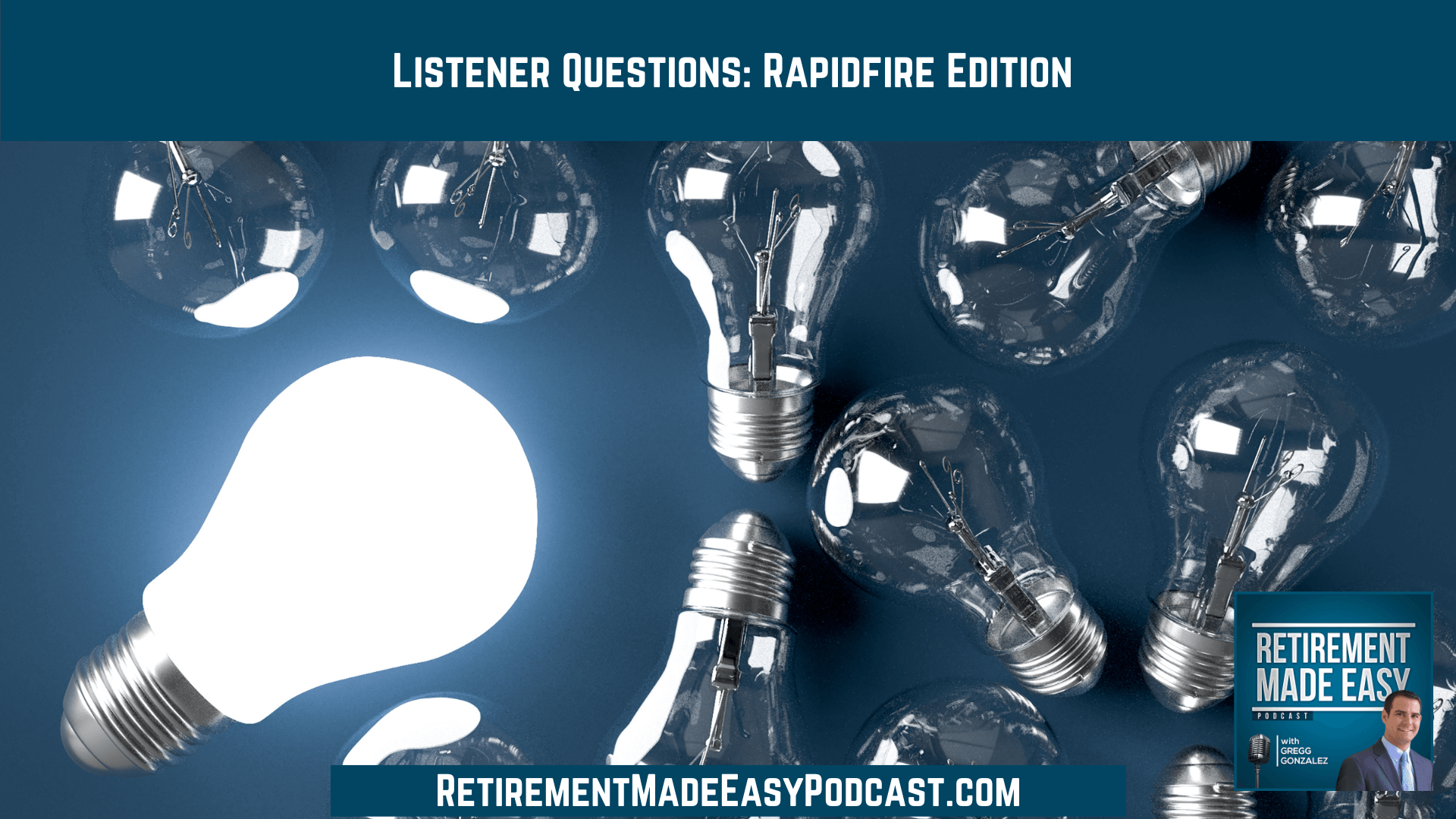
Listener questions have been piling up and a Q&A is LONG overdue. So in this episode of the Retirement Made Easy podcast, I’ll cover as many questions as I can. I’ll cover everything from Medicare Part B to SEP IRAs, and the impact of inflation to collecting Social Security benefits. Don’t miss this comprehensive episode!
You will want to hear this episode if you are interested in…
- [3:54] Question #1: Does Biden’s ESG veto impact your brokerage accounts?
- [7:17] Question #2: Why is my husband’s Medicare Part B premium so high?
- [10:00] Question #3: Why can’t I contribute to my Roth SEP IRA yet?
- [11:33] Question #4: Can you help us understand the impact of inflation?
- [16:07] Question #5: How should I invest my Roth IRA and 401k?
- [20:00] Question #6: Can you help manage a trust?
- [23:44] Question #7: What happens if you die before collecting social security?
Why is my husband’s Medicare Part B premium so high?
The listener’s husband turned 65 and applied for Medicare. They were shocked when his Medicare Part B premium was far higher than expected (and his Social Security benefit was reduced far more than they expected). She thought it would be $165 per month, which would cover 80% of his medical costs. Then he’d get a supplement to cover the rest. Why is his premium so high?
The Part B Medicare premium is income-based. The amount you’re paying for the premium is based on your income two years prior. I bet if you go back and look at his earnings from two years ago, they were likely over the limit for the $165 premium. There’s a premium table that dictates the premiums you’re paying today. If you believe you’re being overcharged, there’s a special form you can submit to appeal the premium. It’s linked in the resources below!
Can you help us understand the impact of inflation?
One of the biggest risks of retirement planning is the rising cost of living, i.e. inflation. Inflation heavily impacted people in 2022. Retired people especially felt it. How can we understand the real risks of inflation?
A 62-year-old non-smoking couple in the US has a joint life expectancy of 30 years. The wife is predicted to pass away at 92. If you’re planning for a 30-year retirement, you have to factor in the rising costs of living. Inflation WILL impact your retirement.
But our brains find it hard to imagine things in the future. It seems less real. So instead of trying to guess what costs are 30 years in the future, look back 30 years. How were things in 1993? The cost of stamps, Big Macs, cars, and college tuition has risen significantly since 1993. Prices will continue to rise over time. So you need a retirement plan that accounts for rising living costs.
Can you help manage a trust?
A listener’s husband passed away. When he died, all of their accounts went into a trust. The trust names his two daughters and son as co-trustees. They are now responsible for making financial decisions for their mom. However, the kids and their spouses seem to be struggling with the responsibility—The value of the trust was down 38% in 2022. What can she do?
Go see an attorney. With the kids being named as trustees, they get to call the shots. The trust should have designated a financial planner or institution to manage the trust after the husband’s passing. The trust should also include guidelines of what the trust can be invested in, what income comes out of it for the widow, etc.
The couple should have been working as a team with a competent financial planner so that when the husband passed, the wife could turn to her financial planner. But because that isn’t the case, I recommend speaking with an attorney. I’m sure the children are trying to do what’s best, but they likely just aren’t qualified to manage the fund.
What happens if you die before collecting social security?
I had a 45-minute conversation with a bright and friendly listener. He’s a single guy worried about his social security. He’s been paying into social security for 39 years. If he delays his benefit until he’s 70 and dies, does social security pay out a measly death benefit? If he dies before collecting, where does all of that money go? Is it essentially gone?
Hypothetically speaking, yes, it’s gone. There is no residual value there. This gentleman didn’t believe this was fair. So what can you do if you’re worried about passing away before claiming benefits?
He could always claim his benefit early and suspend it later if need be. You can always start your benefit—and within 12 months of starting it—can suspend or withdraw the application. Hoover, you will have to pay back what you received. What else can you do? Listen to the whole episode to learn more!
Resources & People Mentioned
- 9 Ways the SECURE Act 2.0 Will Impact Retirees, Ep #132
- 3 Steps to Retirement Planning
- Biden Vetoes First Bill
- Medicare Part B Premium Chart
- Medicare Part B Appeal Form
Connect With Gregg Gonzalez
- Email at: Gregg@RetireSTL.com
- Podcast: https://RetirementMadeEasyPodcast.com
- Website: https://StLouisFinancialAdvisor.com
- Follow Gregg on LinkedIn
- Follow Gregg on Facebook
- Follow Gregg on YouTube
Subscribe to Retirement Made Easy
On Apple Podcasts, Spotify, Google Podcasts
Connect With Gregg Gonzalez
- Email at: Gregg@RetireSTL.com
- Podcast: https://RetirementMadeEasyPodcast.com
- Website: https://StLouisFinancialAdvisor.com
- Follow Gregg on LinkedIn
- Follow Gregg on Facebook
- Follow Gregg on YouTube



